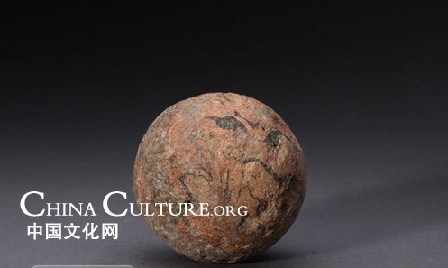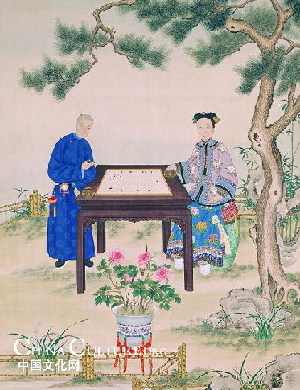Art
See the Ancient Games from these Treasures
Updated: 2008-08-27 10:03
Chinese chess originates from the battle of ancient times. Its pieces are named after arms or military titles of ancient army such as 车(literally means war chariot), 马(literally means war-horse), 炮(literally means cannon),卒(literally means soldier), 相(literally means prime minister in ancient China) and 将(literally means general). Compared with Taoism in Weiqi, Chinese chess embodies Confucianism which advocates a positive attitude in daily life or in battles. There are a lot of stories about the origin of Chinese chess, but it is universally thought that Chinese chess was basically formed in the Song Dynasty (960-1279).
Ball intertwining strips of clay (Song Dynasty)
Collected by the Palace Museum
This ball is intertwined strips of clay, initially called Chuiwan in ancient times which is a game that players scored points by hitting the pellet into a socket in the ground. Prevailing in Song, Yuan and Ming Dynasties this game was developed from Cuju.
|
|
It needed to draw a base on the ground and dig some holes tens or hundreds steps away from the base and insert some colored flags around the holes; then players standing at the base would hit the pellet into holes to score points. It can be played by two players or many, and is believed to be similar to modern golf.
The Scroll of Empress Xiaoqin Playing Weiqi (Qing Dynasty)
Collected by the Palace Museum
|
|
Empress Xiaoqin is generally known as Cixi in China’s history, who is the wife of emperor Xianfeng. She was good at poetry, painting and calligraphy as well as playing Weiqi. This picture portrays empress Xiaoqin playing Weiqi in the royal garden.
Specials

President Hu visits the US
President Hu Jintao is on a state visit to the US from Jan 18 to 21.

Ancient life
The discovery of the fossile of a female pterosaur nicknamed as Mrs T and her un-laid egg are shedding new light on ancient mysteries.

Economic Figures
China's GDP growth jumped 10.3 percent year-on-year in 2010, boosted by a faster-than-expected 9.8 percent expansion in the fourth quarter.

